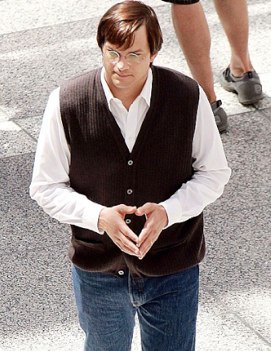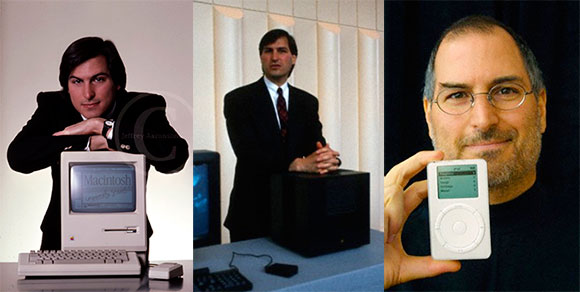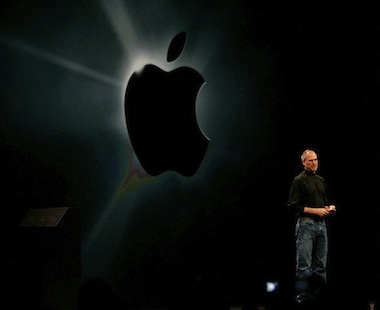Posts tagged 'Steve Jobs Sony Pictures biopic'
Kutcher has a date and Sorkin has a pitch
As promised, here is my take on the news about the two upcoming Steve Jobs movies. For those suffering from chronic memory loss, these movies are:
- JOBS (ex-jOBS, a.k.a. “the Kutcher picture”), an independent movie directed by Joshua Stern starring Ashton Kutcher
- and “the Sorkin movie”, my codename for a Sony Pictures Entertainment project using the rights for Walter Isaacson’s Steve Jobs (bought for $1 million), whose script will be written by Aaron Sorkin (scriptwriter of The Social Network)
Narrative
The most obvious and perhaps most interesting difference between these two movies is their timeframe. Indeed, JOBS will focus mainly on Steve Jobs’s youth, from 1971 (age 16, in high school, when he was friends with Woz) to the comeback at Apple (or even later… 2000? when he became Apple’s CEO?)

Kutcher as Jobs
For those of you have seen the only fiction movie about Steve Jobs yet, Pirates of Silicon Valley starring Noah Wyle as Steve Jobs, the choice of period is very similar. Pirates starts in the Berkeley riots of the late 1960s, to show the friendship between Steve and Woz, and ends at the Macworld Boston keynote in July 1997 (the famous “Gates as Big Brother” keynote). But the bulk of the action happens in the early 1980s, during the development of Macintosh, and there is no mention of NeXT or Pixar (the years 1985 to 1996 are actually not showed at all). Pirates is different though, as Bill Gates is as important a character as Steve Jobs in that TV movie.
As a result, the narrative in Pirates is alternating between telling the stories of both characters, and Steve only gets half the spotlight, with short but symbolic scenes such as the West Coast Computer Faire, Apple’s IPO, his relationship with Chris-Ann and Lisa, celebrations and arguments with the Mac team, or his 30th birthday. The TV movie was actually successful portraying a dramatized but fairly accurate picture of the two fathers of modern personal computing, and SJ himself acknowledged it by inviting Noah Wyle disguised as his modern self to introduce the Macworld NY 1999 keynote.

Noah Wyle as Steve Jobs in Pirates of Silicon Valley
It’s an open question whether JOBS can pull off such an accomplishment. Since we know the movie is at least showing Jobs in India (age 19) and in 1997 (age 42), the question is, what in these 25+ years will be showed, and what will be forgotten? I hope it won’t be as bad as the Isaacson bio, which managed to dedicate one whole chapter on the week of the departure from Apple, and one other chapter for the whole decade at NeXT… But I have my doubts on the portrayal of the NeXT and Pixar ventures. NeXT is crucial in Steve’s history, as it was, after all, the first time he was truly the man in charge, and its failure was the basis for the resurrection of Apple. As for Pixar, of course, there wouldn’t have been a return to Apple without the media attention and riches that the animation studio brought to Steve.
I am not implying that giving a compelling yet accurate picture of a life so eventful is easy. I have myself agonized (and still am) over the writing of Steve’s biography, which simultaneously follows different threads: the Lisa drama at the time of the IPO, the struggles with NeXT and with Pixar concurrent to the discovery of Mona and the wedding with Laurene, etc. To do all this in a 120-minute format is next to impossible, and something’s gotta give. I hope that JOBS doesn’t let go of the main drive of Steve’s life, his passion for technology. I wonder, for example, how the trip to Xerox PARC will be depicted (if at all). Same with the NeXT Cube introduction. This is one area where Pirates of Silicon Valley was actually not bad.
For the Sony movie, the answer to the question “what will be ignored” is actually quite simple: “almost everything”.
Indeed, as I said in the intro, Sorkin’s intention is to have the movie play out in real time (meaning every minute on the screen is a minute in the movie), with no flashbacks or cuts of any sort. Three times thirty minutes, the thirty minutes that precede Jobs’s entry on stage for three key product introductions in his career: that of the Macintosh, the NeXT Cube, and the iPod.

1984, 1988 and 2001 – the three pillars of Aaron Sorkin’s scripts
First of all, what was the point of buying the rights of Isaacson’s bio to write such a script? All the facts there are to know are in the recordings of those events (including that of the NeXT Cube intro, which I have been longing for for the past five years now). The rest can only be in allusions or short appearances of characters, and will not be from the bio for sure. Actually it is obvious already what will not be in such a movie: anything having to do with Jobs’s family (Lisa, Mona, Laurene, Reed, Erin or Eve); or even, anything Pixar? I don’t see how they could fit in the narrative as Sorkin describes it. And how could the complexities of the character be reflected in such small segments? I just watched Scorsese’s The Aviator again to get some perspective —imagine if the whole movie had been reduced down to just the premiere of Hell’s Angels, the plane crash, and the Congressional trial, for instance; how would that give a rich description of Howard Hugues? Needless to say, I am skeptical.
Yes, it is hard to do a full-blown biopic, and if Sorkin listened to me, he would have to do a Lord-of-the-Rings-type trilogy, even a tetralogy (1955-85; 1985-1996; 1997-2007; 2007-2011 would probably be a nice breakdown). I am (and you are, if you’ve read this far) probably one of the few people on this planet who would bear to sit for 14 hours to re-live the life of Steve Jobs on the big screen. But I understand that Hollywood is an industry and that such an endeavour would not make much business sense. The problem is that I’m not sure Sorkin’s approach makes much sense, either.
Let’s give the man credit and suppose that he pulls this off. After all, he does have a good track record. So suppose his three-scenes-before-keynotes approach works well —still, I can’t get around his choices for those three keynotes. The idea, I assume, is to give snapshots of Steve’s personalities at very different moments of his life. The plot could be organized around such lines: first, the arrogant young millionaire at the peak of his early success; then, a fallen-angel type of deal with NeXT, the thirty-something entrepreneur back with a vengeance (and perhaps a healthy dose of moving scenes relating to Lisa or Mona); and finally the 45-year-old ready to take over the world.
To start with, it is bold to begin the movie in 1984. I personally like the idea to ignore the oft-told tale of the hippie days at Reed or in India, and the garage days of Apple. But to start with the Macintosh launch means probably skipping over the rough early 1980s, and how they transfigured young Jobs, with the intense learning of business, the riches and the fame from the IPO, the inner conflicts with Lisa (the girl) and Chrisann, the Eureka moment at Xerox PARC, and the fanatical days of the development of Macintosh after the failure of Lisa (the computer).
The jump from 1984 to 1988 makes more sense — some might say it’s just four years, which can be summed up with the crisis and departure of Apple, and the development of NeXT… oh, yes, there’s also that side project, a little startup called Pixar (don’t count on that one). Yet in these four years, Steve changed a lot, and I have to give credit to Sorkin for dedicating a third of his script to a crucial turnaround point in Steve’s life, which is all too often plain forgotten. I’m actually quite excited to see how NeXT could be presented in that segment. Will it be all about “revenge”? Yes, revenge was part of NeXT, but the ambition of the Cube was so much more. In a lot of ways, Steve of 1988 was a prototype to Steve of Apple 2.0. I wonder if Sorkin gets that.
Much more radical is the switch from 1988 straight to 2001. How will that account for the ten years of struggle at NeXT and Pixar? The new family life? The late triumph of Pixar? The comeback and subsequent coup at Apple? Again, I suspect NeXT and Pixar will be left in the background, and that Sorkin will try to drop hints at the future of Apple instead… that’s why the choice of the iPod keynote left me dumbfounded. Like I suspect many others, I would have bet a fiver on the iPhone introduction instead. Not only because the iPhone was perhaps Steve Jobs’s greatest masterpiece, and its introduction blew the whole world away. But also because he was actually conscious of that, and made that keynote as dramatic as can be. Everyone who watched it remembers how he started the iPhone section of his presentation by telling he couldn’t sleep the night before, because he knew that Apple was about to make history once again.

Not so for the iPod. Far from it. For those that doubt it, just watch the keynote again. I wouldn’t say it’s dull or boring, because the product was damn exciting — but you could tell neither Jobs nor the audience (mostly press and Apple employees) expected it to be da bomb that it turned out to be. And as a result, the iCEO wasn’t nearly as charismatic as he was at Macworld 2007. The scale of the keynote certainly played its part too, it was only in the small auditorium of Cupertino vs. the huge hall of Moscone West.
I don’t think that Sorkin will reflect that lack of showmanship and excitement in his movie. In fact, I expect him to put a lot in that segment that shouldn’t, that couldn’t have happened in 2001. I actually think this is what the success of his script boils down to: the sum of the choices he will have to make, because of the format he’s chosen. There’s a very high bar for him to make good ones. My hat’s off to him if he manages to give birth to a masterpiece within these self-imposed constraints.
A paradox
The two Jobs movies were not born under the same star.
One was conceived in 2011, after Steve’s resignation but before his passing. It is an independent movie whose creators come mostly from TV and have no track record with feature-length films, including its lead star, Ashton Kutcher, who started out as a model. It will premiere at the Sundance Film Festival, the first choice for most independent features. The other is based on Walter Isaacson’s authorized biography. The book was written with Jobs’s full cooperation, but it was rushed to market after his death, to successfully become one of the best selling books of the year. Very soon afterwards, the rights were sold to major studio Sony Pictures for a couple million dollars. One of Hollywood’s most highly-regarded writers was put in charge of drafting its scripts. It will certainly be introduced with a huge media campaign à la Hollywood.
Here comes a paradox.
On the one hand, history suggests that movies in the hands of major studios tend to feature high-profile movie starts, be overkill in production values, and unimaginative with their narrative. On the other hand, independent cinema tries to compensate its lack of visual debauch and its usually obscure cast (due to scarce funds) by being more audacious with its subject matters and plots.
This is not what we’re starting to see here. The independent movie has a movie star in its own right. And from the first images we’ve seen, the production values seem to be impeccable. The costumes and sets are almost perfect reproductions of the 1980s and the early days of Apple. Kutcher was even cast probably for the reason that he looks so much like young Steve Jobs! But his talent at impersonating our hero will have to be tested. I have honestly never watched anything from his filmography, and in fact, I had never heard of him before he was picked for JOBS. So I can’t judge him before I see the movie. However, I can’t help but hear a lot of bad rap, especially along the lines of “almost anything can be played by actors —except intelligence”. I will give Kutcher the benefit of the doubt, but this is definitely the fear: perfect form, and no substance, a movie that looks like a documentary but misses the essence of its main character. I hope this isn’t the way JOBS will go down into history.
The Sony movie is also breaking clichés on cinema. We’ll have to see if Sorkin’s plan is followed through by the studio, but if so, needless to say that the narrative of the movie will be quite unconventional. That’s right —a lot less conventional than its independent counterpart! It will be the big production that takes the most risk. I still have my doubts as to what Sorkin can make of the Steve Jobs story. Will he —can he— get it? Again, the final word will come when both movies are out. But the outcome might be quite unlike what one could have expected!
Needless to say, I am quite excited by the prospect of watching and reviewing those two movies. Please, dear moviemakers, hurry up!